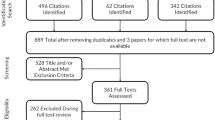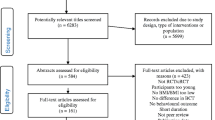Abstract
Purpose
There are discrepancies between patients’ expected weight loss and what is considered achievable after bariatric surgery. This study describes the association between patients’ expectations and actual weight loss, 1 and 2 years postoperatively.
Materials and Methods
A prospective observational study was performed. The association between expectations and actual weight loss (% total weight loss) was explored using linear regression analyses, adjusting for baseline demographics, surgery types, and self-esteem (Rosenberg self-esteem scale) and repeated separately per gender. Gender differences in motivations were explored using Chi-square tests.
Results
Of 440 patients at baseline, results on 368 (84%) at 1 year and 341 (78%) patients at 2 years were available. Significant and opposite associations were found when analyzing genders separately. There was a significant negative association between expectations and %TWL in men at 1 year (β − 0.23, p = 0.04) and 2 years postoperatively (β − 0.26, p = 0.03), indicating smaller weight loss for greater expectations. In women, a significant positive association (β 0.24, p < 0.01) was found 2 years postoperatively, indicating greater weight loss for greater expectations. Both genders were mainly motivated by health concerns, but women were also motivated by reduced self-confidence to lose weight.
Conclusions
Higher expectations were negatively associated with weight loss in men, but positively in women. This may be due to men being motivated by physical complaints, which improve with lower weight-loss. Women are also driven by reduced self-confidence, which may influence weight loss maintenance behaviors. Higher weight loss goals should not be considered as a contra-indication for surgery, but may be utilized to achieve patients’ goals.
Similar content being viewed by others
References
Sogg S, Lauretti J, West-Smith L. Recommendations for the presurgical psychosocial evaluation of bariatric surgery patients. Surg Obes Relat Dis United States. 2016;12:731–49.
Fried M, Yumuk V, Oppert J-M, et al. Interdisciplinary European guidelines on metabolic and bariatric surgery. Obes Facts. 2013;6:449–68. [Internet]. Available from: https://www.karger.com/Article/FullText/355480
Mechanick JI, Youdim A, Jones DB, et al. Clinical practice guidelines for the perioperative nutritional, metabolic, and nonsurgical support of the bariatric surgery patient - 2013 update: Cosponsored by American Association of Clinical Endocrinologists, the Obesity Society, and American Society. Surg Obes Relat Dis. 2013;9:159–91.
Fabricatore AN, Crerand CE, Wadden TA, et al. How do mental health professionals evaluate candidates for bariatric surgery? Survey results. Obes Surg. 2006;16:567–73. [Internet]. Available from: http://www.ncbi.nlm.nih.gov/pubmed/16687023
Bauchowitz AU, Gonder-Frederick LA, Olbrisch M-EE, et al. Psychosocial evaluation of bariatric surgery candidates: a survey of present practices. Psychosom Med. 2005;67:825–32.
Walfish S, Vance D, Fabricatore AN. Psychological evaluation of bariatric surgery applicants: procedures and reasons for delay or denial of surgery. Obes Surg. 2007;17:1578–83.
Homer CV, Tod AM, Thompson AR, et al. Expectations and patients’ experiences of obesity prior to bariatric surgery: a qualitative study. BMJ Open. 2016;6:e009389.
Zijlstra H, Larsen JK, De Ridder DTD, et al. Initiation and maintenance of weight loss after laparoscopic adjustable gastric banding. The role of outcome expectation and satisfaction with the psychosocial outcome. Obes Surg. 2009;19:725–31.
Wolfe BL, Terry ML. Expectations and outcomes with gastric bypass surgery. Obes Surg. 2006;16:1622–9.
Wee CC, Jones DB, Davis RB, et al. Understanding patients’ value of weight loss and expectations for bariatric surgery. Obes Surg. 2006;16:496–500.
Wee CC, Hamel MB, Apovian CM, et al. Expectations for weight loss and willingness to accept risk among patients seeking weight loss surgery. JAMA Surg. 2013;148:264–71.
Kaly P, Orellana S, Torrella T, et al. Unrealistic weight loss expectations in candidates for bariatric surgery. Surg Obes Relat Dis. 2008;4:6–10.
White MA, Masheb RM, Rothschild BS, et al. Do patients’ unrealistic weight goals have prognostic significance for bariatric surgery? Obes Surg. 2007;17:74–81.
Price HI, Gregory DM, Twells LK. Weight loss expectations of laparoscopic sleeve gastrectomy candidates compared to clinically expected weight loss outcomes 1-year post-surgery. Obes Surg. 2013;23:1987–93.
Bauchowitz A, Azarbad L, Day K, et al. Evaluation of expectations and knowledge in bariatric surgery patients. Surg Obes Relat Dis. 2007;3:554–8.
Heinberg LJ, Keating K, Simonelli L. Discrepancy between ideal and realistic goal weights in three bariatric procedures: who is likely to be unrealistic? Obes Surg. 2010;20:148–53.
Karmali S, Kadikoy H, Brandt ML, et al. What is my goal? Expected weight loss and comorbidity outcomes among bariatric surgery patients. Obes Surg. 2011;21:595–603.
Fischer L, Nickel F, Sander J, et al. Patient expectations of bariatric surgery are gender specific - a prospective, multicenter cohort study. Surg Obes Relat Dis. 2014;10:516–23.
Diniz MDFHS, Passos VMDA, Barreto SM, et al. Different criteria for assessment of roux-en-y gastric bypass success: does only weight matter? Obes Surg. 2009;19:1384–92.
Dalle Grave R, Calugi S, Compare A, et al. Weight loss expectations and attrition in treatment-seeking obese women. Obes Facts. 2015;8:311–8.
Dalle Grave R, Calugi S, Molinari E, et al. Weight loss expectations in obese patients and treatment attrition: an observational multicenter study. Obes Res. 2005;13:1961–9.
Lent MR, Vander Veur SS, Peters JC, et al. Initial weight loss goals: have they changed and do they matter? Obes Sci Pract. 2016;2:154–61. [Internet]. Available from: http://www.ncbi.nlm.nih.gov/pubmed/27840688
Vidal P, Ramón JM, Goday A, et al. Lack of adherence to follow-up visits after bariatric surgery: reasons and outcome. Obes Surg. 2014;24:179–83.
DATO. Dutch Audit for Treatment of Obesity - 2017 Year Report [Internet]. 2017. [cited 2019 Apr 16]. Available from: https://dica.nl/jaarrapportage-2017/dato
Durant NH, Joseph RP, Affuso OH, et al. Empirical evidence does not support an association between less ambitious pre-treatment goals and better treatment outcomes: a meta-analysis. Obes Rev. 2013;14:532–40.
Crawford R, Glover L. The impact of pre-treatment weight-loss expectations on weight loss, weight regain, and attrition in people who are overweight and obese: a systematic review of the literature. Br J Health Psychol. 2012;17:609–30.
Aelfers SCW, Schijns W, Ploeger N, et al. Patients’ preoperative estimate of target weight and actual outcome after bariatric surgery. Obes Surg. 2017;27:1729–34.
Foster GD, Wadden TA, Vogt RA, et al. What is a reasonable weight loss? Patients’ expectations and evaluations of obesity treatment outcomes. J Consult Clin Psychol. 1997;65:79–85.
Libeton M, Dixon JB, Laurie C, et al. Patient motivation for bariatric surgery: characteristics and impact on outcomes. Obes Surg. 2004;14:392–8.
Gorin AA, Pinto AM, Tate DF, et al. Failure to meet weight loss expectations does not impact maintenance in successful weight losers. Obesity. 2007;15:3086–90.
Nederlandse Werkgroep Bariatrische Psychologie NOK. Richtlijn Bariatrische Psychologie. 2015
Brethauer SA, Kim J, el Chaar M, et al. Standardized outcomes reporting in metabolic and bariatric surgery. Obes Surg. 2015;25:587–606.
World Health Organization. Global Database on body mass index - BMI classification [Internet]. 2018. [cited 2018 Feb 21]. Available from: http://apps.who.int/bmi/index.jsp?introPage=intro_3.html
Franck E, De Raedt R, Barbez C, et al. Psychometric properties of the Dutch Rosenberg Self-Esteem Scale. Psychol Belg. 2008;48:25. [Internet]. Available from: http://www.psychologicabelgica.com/articles/abstract/10.5334/pb-48-1-25/
Twisk JWR. Inleiding in de toegepaste biostatistiek - Hoofdstuk 7 Multiple regressieanalyse: associatie- en predictiemodellen. 2nd ed. Maarssen: Elsevier Inc.; 2010.
Price HI, Gregory DM, Twells LK. Body shape expectations and self-ideal body shape discrepancy in women seeking bariatric surgery: a cross-sectional study. BMC Obes. 2014;1:28.
Gourash WF, Lockhart JS, Kalarchian MA, et al. Retention and attrition in bariatric surgery research: an integrative review of the literature. Surg Obes Relat Dis. 2016;12:199–209.
Wing RR, Lang W, Wadden TA, et al. Benefits of modest weight loss in improving cardiovascular risk factors in overweight and obese individuals with type 2 diabetes. Diabetes Care. 2011;34:1481–6.
Diabetes Prevention Program Research Group. 10-year follow-up of diabetes incidence and weight loss in the Diabetes Prevention Program Outcomes Study. Lancet. 2009;374:1677–86.
Acknowledgements
We would like to thank Monique de Kort, specialist nurse for bariatric surgery, for her diligent work in the follow-up of our patient group.
Funding
The department of surgery was funded for this research by the VGZ Healthcare Insurance Innovation Fund (P6500/D3957) and CZ Healthcare Insurance Fund (201500203), the Netherlands. The authors declare that they have no other conflicts of interest.
Author information
Authors and Affiliations
Corresponding author
Ethics declarations
Conflict of Interest
This study was funded by the VGZ Healthcare Insurance Innovation Fund (P6500/D3957) and CZ Healthcare Insurance Fund (201500203), the Netherlands. The authors declare that they have no other conflicts of interest.
Ethical Approval
All procedures performed in this study were in accordance with the ethical standards of the institutional and national research committee and with the 1964 Helsinki Declaration and its later amendments or comparable ethical standards. Informed consent was obtained from all individual participants included in the study.
Additional information
Publisher’s Note
Springer Nature remains neutral with regard to jurisdictional claims in published maps and institutional affiliations.
Rights and permissions
About this article
Cite this article
Theunissen, C.M.J., van Vlijmen, A., Tak, D.J.A.M. et al. Motivation and Weight Loss Expectations in Bariatric Surgery Candidates: Association with 1- and 2-Year Results After Bariatric Surgery. OBES SURG 30, 4411–4421 (2020). https://doi.org/10.1007/s11695-020-04811-x
Received:
Revised:
Accepted:
Published:
Issue Date:
DOI: https://doi.org/10.1007/s11695-020-04811-x




